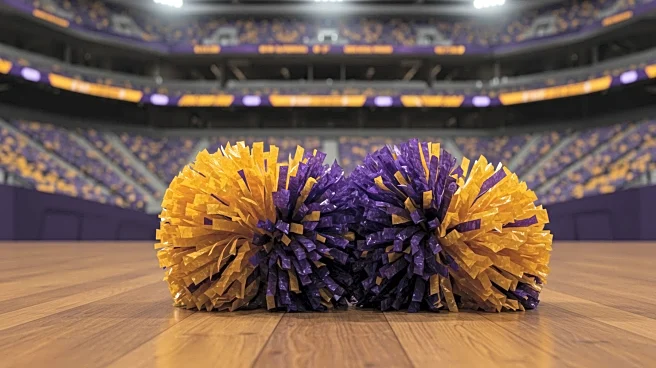What's Happening?
The Minnesota Vikings have introduced male cheerleaders Blaize Shiek and Louie Conn to their 2025 cheerleading squad, sparking mixed reactions from fans. The inclusion of male cheerleaders has led to some criticism and threats from fans to withdraw their support for the team. In response, Shiek humorously addressed the controversy on social media, while the Vikings organization issued a statement defending the decision. The team emphasized that male cheerleaders have been part of professional and collegiate cheerleading for some time and highlighted the rigorous selection process based on talent and dedication. The Vikings' move aligns with a broader trend in the NFL, where approximately one-third of teams now include male cheerleaders.
Why It's Important?
The inclusion of male cheerleaders in the Minnesota Vikings' squad reflects a growing trend towards diversity and inclusivity in professional sports. This development challenges traditional gender roles and could influence other teams to adopt similar practices. The backlash from some fans underscores ongoing societal debates about gender norms and representation in sports. The Vikings' decision to stand by their cheerleaders may encourage other organizations to prioritize inclusivity, potentially leading to broader acceptance and support for diverse representation in sports. This shift could impact fan engagement and the overall culture within the NFL.
What's Next?
As the NFL season progresses, it will be important to monitor fan reactions and the impact of the Vikings' decision on ticket sales and team support. The organization may continue to address fan concerns and promote the positive contributions of their cheerleaders. Other NFL teams might observe the situation closely, considering similar changes to their cheerleading squads. The broader acceptance of male cheerleaders could lead to increased opportunities for men in the field and further discussions about gender diversity in sports.
Beyond the Headlines
The inclusion of male cheerleaders in the NFL raises questions about the evolving nature of sports entertainment and the role of cheerleaders as ambassadors for their teams. This development may prompt discussions about the historical exclusion of men from cheerleading and the potential for more inclusive practices across various sports. The Vikings' decision could also influence cultural perceptions of masculinity and the acceptance of men in traditionally female-dominated roles.










